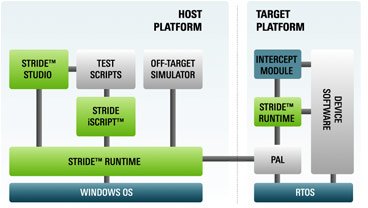Agile testing suite supports Linux
Oct 26, 2006 — by LinuxDevices Staff — from the LinuxDevices Archive — viewsS2 Technologies has revised its OS- and compiler-agnostic embedded software test and verification package. Stride 2.0 adds enhancements for multi-seat deployments, and can be used to exercise, test, and verify software for complex embedded multimedia consumer devices such as wireless handsets, the company says.
Stride 2.0 aims to help developers test software earlier in the development process, before hardware and software components have been integrated. It comprises a graphical application suite for Windows-based development hosts, along with target components that can be deployed on actual, simulated, or “virtual” hardware, according to the company.

S2 Stride 2.0 diagram
Stride 2.0 can be used to “remove” software dependencies, simulate new or missing functions, and capture internal software transactions or events. The program is said to let developers exercise code without writing test code; however, C and various common scripting languages can be used to automate testing.
Suggested uses for Stride 2.0 include:
- Interactive testing during coding
- Unit testing
- Automated white-box integration testing
- Continuous integration
S2 CEO Mark Underseth stated, “Stride 2.0 enables development teams to exercise code earlier while automating testing and increasing white-box visibility. S2 now offers a solid foundation for embedded software verification and integration that will scale with growing software complexity for years to come.”
VDC analyst Stephen Balacco stated, “Large-scale software environments will benefit from technology and infrastructure that enable more effective processes and automation for testing and integration.”
Availability
Stride 2.0 is available now, with prices starting at $8,300. It supports Linux, VxWorks, ThreadX, and “most commercial embedded operating systems,” the company says. Additionally, S2 says Stride has been used to develop mobile handsets based on Windows Mobile, Qualcom's REX, and custom RTOSes.
This article was originally published on LinuxDevices.com and has been donated to the open source community by QuinStreet Inc. Please visit LinuxToday.com for up-to-date news and articles about Linux and open source.